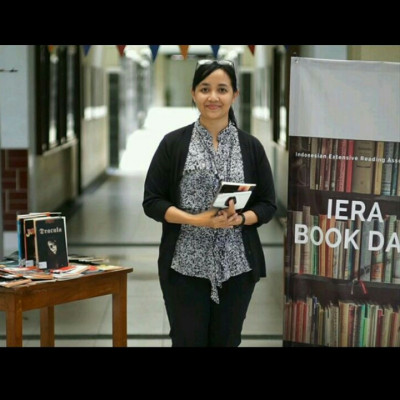Schedule Go Compact (displays all)
You can use Quick Lookup to quickly find sessions. But best is to use the LIVE SCHEDULE during the conference itself.
Please note
This search only includes sessions starting on 14th August [Asia/Tokyo]. It does not include asynchronous sessions.
Developing Reader Identity Through Xreading: A Case Study of EFL University Students’ Perceptions #1589
This presentation addresses how Indonesian university students perceived themselves developing their reader identity through xreading and its follow-up activities. The presentation uses the perspective of literacy as social practice. Preliminary data from survey indicates that students' constructions of reading and being a reader have evolved throughout the online extensive reading.
A Study on the Practice of Extensive Reading for EFL Early Childhood Education Majors in Japan amid the COVID-19 Pandemic #1578
This paper aims to report findings of a survey of English language teaching including extensive reading for early childhood education university students in Japan amid the COVID-19 pandemic. The findings are based on the identified correlations between online and face-to-face instruction modes in the teaching.
A Case Study of a Happy Retired Life from Extensive Reading and listening #1606
The purpose of this study is to investigate what motivates the participants who are in their 50s, 70s, and 80s to continue ER/EL for two to five years. How ER/EL in English stimulates them, and how their lifestyles have changed will be included in the presentation.
Academic Dishonesty on Xreading: A Cautionary Tale #1603
Xreading is very useful for assessing students’ progress, but as with any digital technology, teachers need to be aware of unscrupulous students who may try to cheat. The presenters will provide useful tips to minimize cheating, detect cheaters, and effective strategies to deal with students who have been caught cheating.
Setting up ER Program to Empower Community: A Story from IERA #1566
The presentation aims at sharing best practices and showing opportunities of setting up ER programs in challenging circumstances like in Indonesia. It is hoped that what IERA has done could inspire other communities that plan to set up ER programs in their respective places.
Japanese Extensive Reading: Aesthetic and Efferent Engagement of Learners with Texts #1573
Grammar translation teaching styles in Japanese courses influence Japanese learners to conceive of reading as translating the propositional content of texts. However when reading extensively, learners may adopt different reading styles and patterns of behaviour, indicating that ER can enable students to develop more natural, normal ways of reading.
Assessments in an ER Program: Contradicting the ER Approach? #1583
This presentation will share how alternative assessments can be used as a measurement tool in an ER program without contradicting the nature of ER approach. Some examples will be shared to illustrate the points. It is expected that this session can contribute ideas particularly on assessments in an ER program.
The Ideal MReader Set-Up for Your Kind of School #1570
MReader is free software, offered by the Extensive Reading Foundation that allows students and teachers to track their reading of over 8000 published readers in a gamified and motivating fashion. We will discuss how to tailor MReader for your specific educational context.
Using a Chatbot to Promote Thai Students' Basic Reading Skills #1539
In this paper, I explain what a conversation agent (chatbot) is and demonstrate how a story can be adapted and be made flexible through the use of a Dialogflow conversation agent. I shall also present the feedback and opinions of the students who have interacted with the agent on a voluntary basis. Recommendations will also be given.
Let’s Talk About “Sadness”: Lessons From the Virtual Book Club Activity #1542
Virtual Book Club can be a means for readers to be engaged with the story through group discussions. Talking about the book with other readers can give them the opportunity to share their thoughts, feelings with the hope that they will perceive reading as a meaningful activity.
Students’ Learning Experiences in Using Xreading Books and Audios #1591
This study depicts the learning experience of students of an Indonesian university in using the books and audios available in Xreading as well as finds out whether the students use the books and audios to conduct reading only (RO) and reading while listening (RWL).
Incorporating Extensive Reading in an English Program at the OFM Postulants Community Yogyakarta #1600
This presentation will describe the process of incorporating extensive reading in a community of Catholic men. It will elaborate how the program ran as well as how the students reacted to the program.
Tying Fluency Reading to Regular Course Content #1594
Various activities can be conducted in class to maximize fluency building opportunities with graded readers and regular course target language. Speaking and writing activities based on thematically connected graded readers, and reading aloud activities constructed from target language can promote both wide and narrow fluency development.
The Experience of a Newcomer: Extensive Reading Program Setup – From Zero to 5,000 Readers #1574
In Thailand, implementing an extensive reading program at a university level is relatively new, especially with an online library integration. This presentation focuses on the extensive reading program implementation using the Xreading virtual library at a large public university in Bangkok. The steps taken, the challenges faced, and the lessons learned will be discussed.
X-Reading: The Potential of Integrating Extensive Reading and Students’ Critical Thinking #1604
This paper intends to identify the correlation between ER and students’ critical thinking. The participants of this research are the first-year students of English Education study program in Universitas Negeri Surabaya who take part in ER program. The ER program implemented for students is X-Reading, an online extensive reading website with learning management system (LMS) that provides hundreds of graded readers. The data are collected from the recorded time spent by students on X-reading activities and questionnaires based on students’ perception on how extensive reading contributes to their critical thinking skill. The data are analyzed using Product Moment formula and Coefficient Determination to find out to which extent X-Reading contributes to students’ critical thinking skill.
Cancelled Extensive Reading out of the Classroom #1592
Extensive Reading was promoted through rural school teachers over an entire province. Local school students, especially the teenagers, recognized that learning could be effective over the internet, too.
A 10-Point Guide for Big, Easy Reading Programs #1545
Research clearly shows that your learners can effectively download English into their brains by extensive (BIG) and EASY reading. The presenters will share a 10-Point guide for doing so with online extensive reading, but this guide works for any reading system, and with any class, group, company, or school.
How Readers Are to Be Assisted for Pleasure Reading: A Choice of Assistance to Promote Extensive Reading #1580
This study examines the relationship between reading quality and the way readers monitor their progress. Learners through ER often feel the dilemma of quiz taking or pleasure reading. In this study, learners who read for pleasure demonstrated a better reading habit than those who read for quizzes.
Cancelled Japanese University Students' Reactions to Using an Online Extensive Reading System #1595
This research explored the usage and reactions of 34 second-year Japanese university students enrolled in elective English courses to using the Xreading extensive reading virtual library, quiz and tracking system. Data was collected via an online survey, including Likert-scale and open-ended items, and via the Xreading learning management system.
An Investigation on Indonesian Freshmen's Vocabulary Knowledge #1602
The present study investigated two groups of freshmen’s vocabulary levels pre- and post-Extensive Reading programs in their respective universities.
The application of the Coverage Comprehension Model #1551
The Coverage Comprehension Model (CCM) describes how learners who know >95-98% or more of the tokens within a text are likely to comprehend it. This presentation explains how the operationalization of the CCM is based on four assumptions that research suggests are incorrect. Teachers and researchers will benefit from understanding this.
Using Non-Fiction Books to Facilitate L2 English Acquisition, Peer Collaboration, and Content Learning #1568
This presentation will explain how reading a non-fiction book together as a class can serve as a bridge between Intensive Reading (IR) and Extensive Reading (ER) that facilitates both acquisition and collaboration. The presenter will share strategies for selecting books, managing a reading project, and incorporating language learning activities.
Implementing an Extensive Reading Program in Settlement Language Training Courses: Challenges and Solutions #1608
In this session, the presenter will explore possible reasons why ER has been overlooked in the settlement language training sector in Canada, and suggest ways to remove obstacles and incorporate a program that is both practical and relevant to stakeholders, instructors and learners.
Talking past each other: Chinese EFL teachers’ understanding of Extensive Reading #1540
This presentation reports on findings from an investigation into twenty-four Chinese EFL teachers’ understanding of Extensive Reading (ER). Despite their positive attitude toward ER, results revealed that these teachers’ definition of ER was different from that of researchers in the field of ER.
How Do I Get My Students to LOVE Reading? #1654
Explore the importance of the classroom library and its relationship to reading achievement. Identify the guidelines for a quality classroom library. Discover how to use the classroom library effectively to increase independent reading
Graded Readers as Intralingual Literary Translations #1562
In this short presentation, I will approach graded readers from the perspective of Translation Studies, where they constitute a marginal phenomenon. I will discuss their research potential within the areas of intralingual and literary translation, and I will seek to start a discussion.



































